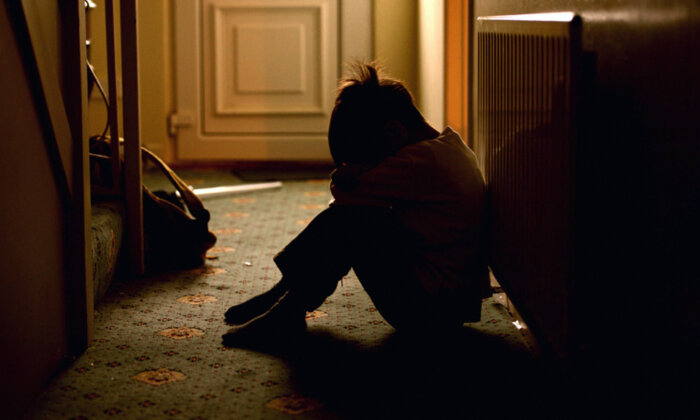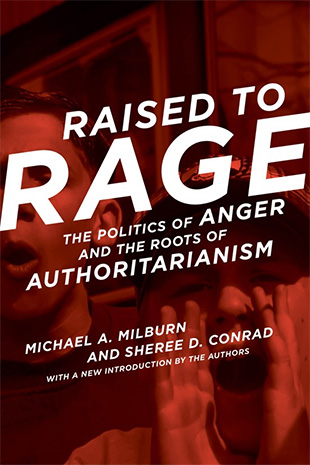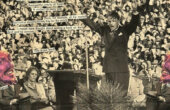Authoritarianism in Training: Donald Trump and the Childhood Roots of Anger

In the 1940s, a small group of researchers at the University of California, Berkeley, began studying anti-Semitism in hopes of identifying potential authoritarians, their term for individuals who would idolize leaders with fascist tendencies. To do this, they developed a personality test that looked for patterns in their subjects’ childhoods, their theory being that repressed childhood emotions are transformed in adulthood into prejudice, hatred, and violence.
If you’ve taken Psych 101, you’ll recognize this line of thinking: The child denies the reality about his or her parents — their rigidity, their punitiveness — and idealizes them, often holding them up as models. At the same time, the child has to split off and deny those aspects of the self the parents scorn — childishness, selfishness, sexuality, and, primarily, anger and aggressive impulses toward the parents. That “bad self” is attributed unconsciously, through the defense mechanism of projection, to others, usually members of minority groups in society, who are then despised as evil, inferior, and dangerous.

Not surprisingly, once people come to believe that a particular group — African Americans, women, gays — are bad, they find it acceptable to take out their rage against these convenient scapegoats. Psychologists refer to this process as displacement.
In a 2014 study published in the journal Political Psychology, Michael Milburn and colleagues found that individuals who reported higher levels of physical punishment in childhood were not only significantly angrier but were also more likely to succumb to hostile attribution bias, the tendency to assume that neutral or ambiguous actions and events are actually motivated by hostility. Such bias toward attributing others’ behaviors to hostile intent has important and potentially dangerous consequences for coloring the perception of adults, Milburn and fellow social and political psychologist Sheree Conrad argue in their book “Raised to Rage: The Politics of Anger and the Roots of Authoritarianism.”
“Everyone wants to believe that the attitudes we hold are a result of a rational deliberative process based on ‘the facts.’ It can be disturbing to confront the possibility that certain emotional experiences in childhood may exert influence that, subsequently, distorts public life,” they write in the book’s introduction. “Yet this uncomfortable possibility must be examined for the United States to confront successfully many important issues of public policy.”
Below, Milburn and Conrad discuss the relationship between politics and denial, how research in cognitive neuroscience has elucidated the biological foundations of their work on social attitudes and authoritarianism, and how Donald Trump’s upbringing, brought to light in Mary Trump’s new book “Too Much and Never Enough,” may have forged his world view and authoritarian leanings.
The Editors: Can you talk a bit about what got you interested in this subject?
Michael Milburn & Sheree Conrad: As political psychologists, we could see a central paradox in the public opinion/public policy relationship. It’s well-documented that prevention of problems is the best way to formulate public policy. However, for several decades, punitive public policies that emphasize power, toughness, and retribution, e.g., “Three Strikes” sentencing laws and the death penalty, have been dominant. In the 2016 presidential campaign, Trump even suggested the killing of terrorists’ families, a war crime. We wanted to get a better idea of how people become authoritarians, with their support for punitive public policies, and also to understand better why so many people consistently vote against their own economic self-interest.
The Editors: So how are people brought to vote against their own self-interest, and how does that connect to your research on childhood trauma?
The Authors: Historically, conservative politicians have tended to protect and advance the interests of wealthy individuals and large corporations. As only a small percentage of the voting public falls into these categories, they seek to persuade citizens to vote against their own self-interests by marrying simplistic economic policies to emotional issues involving power, toughness, and retribution. Richard Nixon, for example, successfully characterized George McGovern’s candidacy as favoring, “Amnesty, Acid, and Abortion,” distracting attention from the destructiveness of the Vietnam War, the Watergate burglary, and McGovern’s populist economic proposals. We’re seeing something similar play out with our current administration.
In times of economic or social unrest, authoritarianism increases.
The very real threats facing us allow demagogic politicians to activate fear and anger stemming from childhood in order to convince voters to go along with simplistic, authoritarian prescriptions for a host of social and political problems.
The Editors: Can you explain the relationship between physical discipline in childhood and support for punitive political initiatives in adulthood?
The Authors: In our research, we have found that the higher the frequency of spanking a person received in childhood, sometimes referred to as “sub-clinical trauma,” the greater the authoritarianism in adulthood, and the greater their support for punitive public policies like the death penalty and the use of military force. We call this “affect displacement theory,” whereby emotion from one source, in this case, childhood, can be carried into adulthood and displaced onto adult political attitudes.
It is important to note that experiencing childhood abuse is not solely ‘yes’ or ‘no’: There are gradations of abuse. Was physical punishment used a lot or a little? It is also important to note that voting is a blunt instrument, reflecting a decision-making process that integrates multiple factors. And there are, of course, multiple influences on public opinion, including a person’s education and gender and economic position, their parents’ attitudes, their friends’ attitudes, and the mass media. Many who voted for Trump did so, we believe, because they anticipated financial benefits and were willing to ignore his racism and sexism. Racism and sexism are often core elements of a person’s authoritarianism, as it puts other people below them.
On a related note, several studies have found authoritarianism to be associated with beliefs in rape myths and hostile attitudes toward women. It’s not surprising that Trump has tremendously negative attitudes toward women — the “pussy-grabbing” that he bragged about in the Access Hollywood tape is one good example of the link between authoritarianism and sexual aggression.
The Editors: You wrote the introduction to “Raised to Rage” in 2016 when Donald Trump had just become the presumptive nominee of the Republican Party. He, like other authoritarian leaders before him, used bigoted rhetoric and fear to galvanize many of his supporters. What is it about this tactic that’s so effective?
The Authors: A lot of people think about attitudes as fixed cognitions that they carry around with them. In fact, for many people, attitudes are generated or modified when they are called to express their views on a particular topic. While the attitudes a person holds are influenced by their parents’, an example of long-term influence, the correspondence is far from perfect. This points to short-term influences, such as an attitude formed when a person is “triggered” by some recent event or other aspect of the political environment.
Using fear as a campaign tactic or way of governing can activate authoritarianism that may be dormant.
Research in our lab done by Jonathan Liss found, for example, that when a person from a high-punishment background is asked to spend some time thinking about their own death, they become more authoritarian. People from low punishment backgrounds express less authoritarianism beliefs. So, using fear as a campaign tactic or way of governing can — we’ll use the word again — activate authoritarianism that may be dormant. In fact, several studies have demonstrated that in times of economic or social unrest, authoritarianism increases.
The Editors: Some critics of your research have argued that there is no causal relationship between physical punishment in childhood and adult attitudes. These critics suggest that the observed relationship between childhood punishment and authoritarianism occurs simply because conservative parents communicate and pass on their conservative attitudes to their children; that they also spank their children more than liberal parents do is unrelated. What’s your response to that?
The Authors: To test this alternative explanation, in addition to measuring individuals’ recall of their childhood experiences and current political attitudes, we also measured (in our 2014 study) how conservative or liberal the individuals’ parents were. All the effects of childhood punishment on anger, hostile attribution bias, and authoritarianism remained significant, even after controlling for parents’ political ideology. This means that the more parents use physical punishment, whether they are liberal or conservative, the more authoritarian their children will be, and the more likely they will be to support punitive public policies like the death penalty and use of military force.
We talk at length in the book about childhood punishment and its effects on the development of authoritarianism along with its negative impact on the political system. This could conceivably be tolerable if spanking children was necessary; in fact, it is not, and the effects of spanking are consistently damaging. A recent meta-analysis of research on the effects of spanking, conducted by psychologists Elizabeth Gershoff and Andrew Grogan-Kaylor, and representing research on over 160,000 children, concluded that there is no evidence of positive results from spanking and considerable evidence of the damage it produces, including increased likelihood of child mental health problems and low self-esteem as well as adult antisocial behavior.
Corporal punishment such as spanking can have neurochemical consequences similar to the consequences of what is widely regarded as more serious trauma.
We use physical punishment in our research because it is easily measured and understandable, but we recognize that it is not the only source of displaced emotion. Other traumatic experiences such as emotional abuse and neglect can be equally damaging, but physical punishment is a readily quantifiable marker for family dysfunction. Our research points to a distortion of adult political attitudes as an addition to the list of negative outcomes from spanking.
The Editors: In the book, you include a few examples of studies in the field of cognitive neuroscience that provide a foundation for affect displacement theory. Can you describe some of those?
The Authors: A major finding from our research is that after recalling their childhood punishment experiences, our research participants were significantly less likely to support the death penalty, compared to individuals who expressed their death penalty opinions without first recalling their childhood experiences. Several years ago, on NPR, cognitive neuroscientist George Lakoff interpreted the finding as a result of neural inhibition. His explanation only makes sense if the regions of the brain where memories of punishment are stored are also involved with generating political attitudes, providing further support for our theory.
Other research in neuroscience also describes the physiological effects that childhood punishment has on the body’s physical system that regulates responses to stress, the Hippocampus-Pituitary-Adrenal axis (the HPA axis). Particularly important for our hypothesized relationship between childhood punishment and adult political attitudes is evidence indicating that corporal punishment such as spanking can have neurochemical consequences similar to the consequences of what is widely regarded as more serious trauma. In 2003, researchers found that frequent spanking, or what they called “subtle forms of infant maltreatment,” in a sample of children one year or less produced higher levels of hormonal responses in the children than the Strange Situation task, a procedure involving repeated withdrawal of the mother and the introduction of a stranger.
In early childhood when most corporal punishment occurs, the limbic system — whose key functions relate to memory, emotion regulation and attachment — is at its period of greatest developmental activity. Evidence that early application of corporal punishment has demonstrable hormonal effects lends support to the hypothesis that the consequences of these effects can be stored in memory and later triggered.
The Editors: Coming back to Trump — how do you believe his upbringing shaped his authoritarian world view?
The Authors: Bullying and hazing are examples of emotional displacement. Having been treated badly, the bully (or upperclassman) unleashes their stored anger at someone younger and more vulnerable than they are. Mary Trump, in her new book, observed, “Donald enjoyed flexing his power, even if only over his younger, smaller, and even thinner-skinned brother (Robert).” This tendency toward bullying did not serve Donald well when he started school. Mary, who’s a psychologist, notes, “When kids go to school, they’re supposed to know that they shouldn’t take other children’s toys and they’re not supposed to hit or tease other children. Donald didn’t understand any of that because the rule in the House, at least as they applied to the boys — be tough at all costs, lying is okay, admitting you’re wrong or apologizing is weakness — clashed with the rules he encountered at school.”
Arrogance is the flipside of insecurity, and that really sums up Donald Trump.
According to Mary, as a child, Donald “suffered mightily,” and he had developed defenses to protect himself from the “indifference, fear and neglect that was part of his childhood.” His father Fred “expected obedience.” It is quite revealing that the story of Trump’s older brother dumping a bowl of mashed potatoes on him when he was seven becomes part of family lore, endlessly repeated at family gatherings — Mary Trump observes the scowl he shows when the story is told, saying, “He clearly still felt the sting of that long-ago humiliation.”
Mary notes that President Trump’s cruelty mirrors the cruelty of his father, and she adds, “In the end, there would be no love for Donald at all, just his agonizing thirsting for it. The rage, left to grow, would come to overshadow everything else.” When Donald was two, his mother became very ill and unavailable as a parent, leaving only Fred Sr. who was a workaholic and emotionally unavailable. The unavailability of a loving parent through death has been found in research in Germany to be predictive of the development of authoritarianism. People can have two different reactions to suffering like this, either internalizing the abuse and lack of self-worth and fall into depression or suicide; or strive constantly to prove to the world that they are really worth something, trying to get enough positive feelings so counter the feelings of self-worthlessness. Arrogance is the flipside of insecurity, and that really sums up Donald Trump. As Mary Trump emphasizes, “The role that fear played in his childhood and the role it plays now can’t be overstated.” Seen from this perspective, he is a very sad man.
Michael A. Milburn and Sheree D. Conrad are professors of psychology at the University of Massachusetts Boston, and the co-authors of “Raised to Rage: The Politics of Anger and the Roots of Authoritarianism.”



